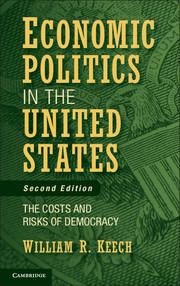Book contents
- Frontmatter
- Contents
- List of Figures and Tables
- Preface to the Second Edition
- Preface to the First Edition
- Part One Introduction
- Part Two Models of Macroeconomic Politics in a Democracy
- 3 Models of Accountability and Opportunism: The Electoral Cycle
- 4 Models of Choice: Partisanship
- 5 Unintended Consequences, Moral Hazard, and Time-Consistency
- Part Three The Sources and Authority of Macroeconomic Goals
- Part Four Institutions and Processes
- Part Five Conclusion
- References
- Index
5 - Unintended Consequences, Moral Hazard, and Time-Consistency
Published online by Cambridge University Press: 05 June 2014
- Frontmatter
- Contents
- List of Figures and Tables
- Preface to the Second Edition
- Preface to the First Edition
- Part One Introduction
- Part Two Models of Macroeconomic Politics in a Democracy
- 3 Models of Accountability and Opportunism: The Electoral Cycle
- 4 Models of Choice: Partisanship
- 5 Unintended Consequences, Moral Hazard, and Time-Consistency
- Part Three The Sources and Authority of Macroeconomic Goals
- Part Four Institutions and Processes
- Part Five Conclusion
- References
- Index
Summary
This chapter uses the recent financial crisis to identify and illustrate three risks of politics and government in general that are not captured by models of routine democratic politics: political business cycles (Chapter 3) and models of partisan competition (Chapter 4). The first is the simple and intuitive possibility that programs that reflect good intentions may have unintended and unanticipated consequences and that some of these consequences may be undesirable. The second is moral hazard, wherein insuring against risk may lead agents to behave less prudently than they would if they were to bear the full costs of the consequences of their behavior. The third is the time-consistency problem, in which there may be a conflict between the right thing to do for all times and the right thing to do at a particular time. These are problems to which all governments are subject, whether authoritarian or democratic, whereas the models of routine politics are unique to countries that choose their leaders through elections.
We focus on the financial crisis of 2007–9, with its aftermath of sluggish growth and high unemployment. The financial crisis exacerbated the deficit and debt problem that preceded it, which will be briefly introduced here and taken up further in Chapter 9. Each of these problems happened independently, but the financial crisis has made the fiscal situation even worse than it would have been without it.
- Type
- Chapter
- Information
- Economic Politics in the United StatesThe Costs and Risks of Democracy, pp. 108 - 126Publisher: Cambridge University PressPrint publication year: 2013



